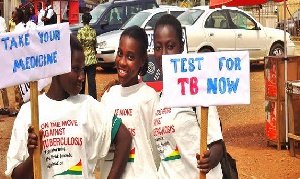 GHana has achieved only 33% of detection rate as against the global target of 70%
GHana has achieved only 33% of detection rate as against the global target of 70%
Ghana has achieved the global target of 85 per cent treatment rate for tuberculosis but the country still lags behind in its detection rate.
Only 15,000 cases of tuberculosis are being detected annually against the expected 75,000 cases; something that is attributed to the absence of modern equipment.
Ghana achieved the global feat under the Millennium Development Goals in 2015 together with 21 other countries but failed to make it to the list of 10 countries that met the global target of 70 per cent case detection.
The country managed to detect only 15,000 cases of tuberculosis, which translate into 33 per cent case detection rate.
The worrying situation has necessitated the introduction of an innovative project to aid the country in achieving zero families with catastrophic costs due to TB by 2020.
Under the project, 50 hospitals will have modern digital x-ray imaging equipment to help in detection rate.
Ghana is targeting to reduce TB deaths by 90 percent and TB incidents by 80 percent by 2030.
Tuberculosis is an infectious disease which affects, especially, the lungs and other parts of the body.
The air-borne disease can be transmitted from one person to the other through sneezing or coughing.
Despite finding a cure for the disease, 1.5 million people globally died from Tuberculosis in 2015 alone, attributed to the late detection of the disease on patients.
The Governments of Ghana and the Netherlands have committed 22 million Euros to implement a project dubbed “Accelerating Tuberculosis Case Detection in Ghana”. The project will introduce innovation and technology to close the case detection gap on TB in Ghana.
Dr Frank Bonsu, Program Manager, said there is the need to intensify efforts to detect TB cases early because most of the cases that comes to the various health facilities go undetected.
At a workshop to introduce the project to the Ghana Health Service, the Minister of Health, Alex Segbefia said TB is one of the top killer diseases in Ghana.
He noted that, Ghana is aiming at reducing tuberculosis to 50 per 100,000 people from the current 290 per 100,000 people by the end of the 12 year project.
A representative from the Dutch Embassy, Ger Steenbergen, observed that most TB cases go undetected because of the use of obsolete equipment.
The situation is the reason why the Dutch government is supporting Ghana with a grant of 8 million Euros to help in case detection.